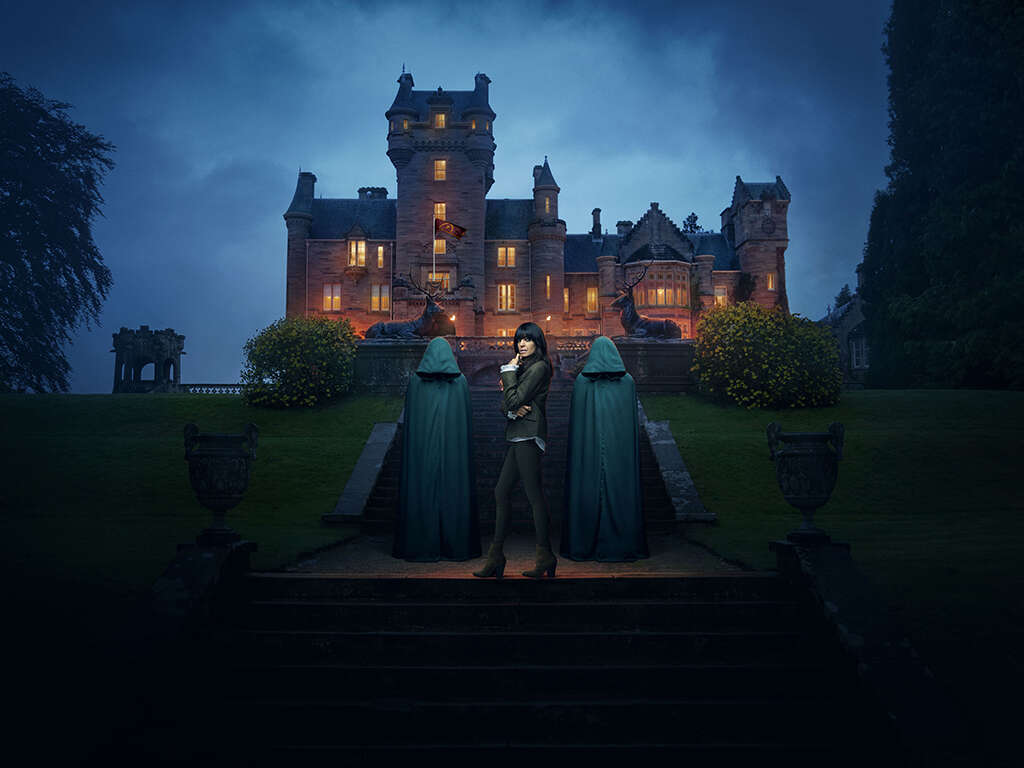
The first series of the BBC reality show The Traitors was a viral hit when it aired at the end of 2022, watched compulsively by audiences across the country. After it earned more than 34 million viewers, a second series was swiftly commissioned, which begins airing on BBC One from 3 January 2024. This article was first published on 14 December 2022.
It’s a premise so deceptively simple that it seems to carry a whiff of desperation; you can hear the echoes of 50 uninspiring pitch meetings in the show’s explanation-heavy intro. What if we put two dozen people in a Scottish castle and forced them to play an elaborate, days-long version of wink murder? Claudia Winkleman really asks the contestants in this BBC series to sit in a circle and close their eyes, before giving a fateful shoulder-squeeze to three players who must take on the role of the Traitors – everyone else is henceforth known as the Faithful. Each night, the Faithful can “banish” one suspected Traitor (voting them out at an evening meeting), and the Traitors can “murder” one Faithful (they send them a letter after dark). Whoever is left standing at the end of the game can take home a share of up to £120,000. A child’s game, then, with the three fundamentals of reality TV chucked at it – a claustrophobic location, money and a melodramatic score.
And yet The Traitors is good – so good – full of betrayal, revelation and bitchiness, despite such low stakes. Why is it such addictive viewing? Perhaps because the viewer is given smug omniscience – we know who the Traitors are, and we watch, god-like, popcorn in hand, as chaos blooms in their wake. Or perhaps it is thanks to the excellent choice of Traitors – there is 28-year-old Wilfred, with his unthreatening brand of friendly banter; 21-year-old Alyssa, quiet, smiling and sweet; and most magnificently of all, Amanda, a Welsh 54-year-old who is all no-nonsense warmth and maternal affection, hiding her lies and her ruthlessness with an ease that is quite thrilling to watch. “What’s on the flag of Wales?” she asks Will. “A dragon,” he replies. “You throw me under the bus – that’s what I will be,” she warns.
Of course, every player believes themselves to be a good judge of character. They are immediately, exquisitely, humbled. Imran, who bangs on about his astrophysics PhD and is totally assured of his superior intelligence, is swiftly booted out. Sunny Maddy is a care home receptionist who, she tells us beaming, also played “a woman without a womb on Casualty”. Tom, a social media magician, snaps and says he has “played down” the extent of his gifts – don’t you realise his “job” is “reading people”! – and with an impassioned flourish, finally identifies a Traitor: incorrectly, as it turns out. On day one, we learn that Nikki wants to win so she might finally afford the bionic hand she has needed since a traumatic accident left her an amputee. If you think this would engender sympathy in her teammates, you’d be wrong. She is swiftly accused of traitorism when she doesn’t raise her glass during a toast to the Faithful. The glass was too far from her only hand, she points out, but too late – Alyssa has already effortlessly sowed the seeds of her downfall with a single comment.
One charge, you quickly realise, is all it takes. The herd mentality on display is staggering – the players turn on each other suddenly, and as one. Though the parameters of the game could not be more clear – and this makes it far less queasy viewing than most reality shows – to be accused of being a Traitor is received with genuine injury and alarm. There are tears, rants, even panic attacks. Winkleman, who wears a series of fingerless gloves and ever-more absurdly oversized turtlenecks, knitwear that creeps above her chin and beyond her knuckles, presides over the whole thing with a sort of gleeful indifference. She saunters in and out of the castle, flicking her fringe from her face to deliver absurd new tasks to raise the total of the prize pot, or to announce shock twists in the rules. The players seem faintly stunned by their own emotional investment in proceedings – but from our vantage point on high, we the audience know it’s the money, the sheer desire to win, that provokes it. From the sofa, it’s hard not to root for the Traitors (everyone, really, wants to be the murderer in these games, don’t they?). They are, after all, undoubtedly having more fun – raising a glass to the Faithful, and choosing their next victim as they drink.
[See also: Stop complaining about January – it’s the best month]



